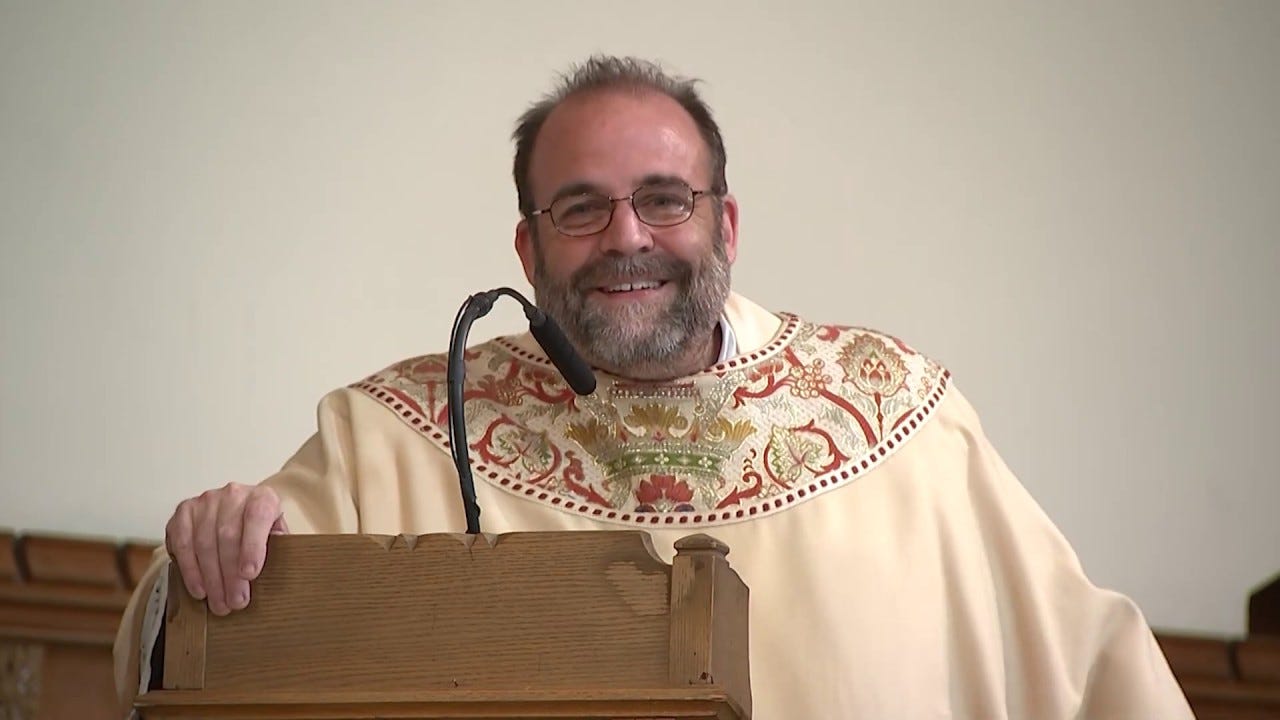What is an Annulment and How Does it Differ From Divorce?
A guest post from Msgr. Charles Pope
I realize that many of my Catholic readers are grappling with the possible end of a relationship and wondering about divorce and annulment, so I thought I’d let an expert answer some of your questions.
I’m honoured that Msgr. Charles Pope has given me permission to re-print his article, “What is an Annulment and How Does it Differ From Divorce?”

In the words of Msgr. Pope:
There are some today who speak of annulment as “just another name for a Catholic divorce.” However, this is not correct.
An annulment (more technically described as a “Declaration of Nullity”) is a recognition by the Church, based on evidence, that what may in fact have seemed to be a marriage, wasn’t—due to some intrinsic flaw at the time the vows were exchanged. A marriage may have been a civil marriage entered into in good faith by one or both of the parties, but something essential was lacking in the intentions or understanding of one or both parties. This made the marriage invalid, meaning a true marriage never existed in religious terms.
Thus there is nothing to divorce, since no marriage existed. “Divorce” is a term of civil law and the Lord explicitly teaches that he will not be bound by the decision of some civil judge (see Malachi 2:16 ; Matthew 19:1-12, among others). However, not every couple who goes through a marriage ceremony does so validly, and that’s the key matter in question in the process of annulment.
It’s actually our Lord Jesus himself who makes this point at the the very moment He teaches against divorce. Let’s look at what he teaches.
The Biblical Root of Annulments.
In regards to marriage, Jesus says: “What God has joined together, let no one divide” (Mat 19:6). On the face of it, divorce and any sort of annulment would seem forbidden by this verse, but the text actually serves as a basis for the Church’s allowance of annulment under certain circumstances.
The text clearly says, what GOD has joined together cannot be divided.
Just because two people stand before a Justice of the Peace, or a minister or even a priest and swears vows, does not mean that what they do is a work of God.
There must be some standards that the Church insists upon for us to acknowledge that this vow is “of God.”
There are a number of impediments that can render a vow invalid.
Situations such as prior marriage, consanguinity (too close in the blood lines), minor status (too young), incapacity for the marriage act, and lying or failing to disclose important information to the future spouse, all need to be considered.
Further, it is widely held that when one or both parties are compelled to enter the marriage or that they display a grave lack of due discretion on account of immaturity or poor formation, that such marriages are null on these grounds. All these are ways that the Church, using her power to bind and loose, comes to a determination that what appeared to be a marriage externally was not in fact so based on evidence. Put more scripturally, the putative marriage was not “what God has joined together.”
You may ask, “Who is the Church to make such a determination?”
I answer that, the Church is in fact the one to whom the Lord, through the ministry of Peter and the Bishops, entrusted the power to bind and loose (Mt 18:18) and to speak in His name (Lk 10:16).
Annulments are not Divorces
As noted, a decree of nullity from the Church is a recognition, based on the evidence given, that a marriage in the Catholic and Biblical sense of the word never existed. Since a person has not in fact been joined by God they are free to marry in the future. In such a case a person does not violate our Lord’s declaration that one who divorces their spouse and marries another commits adultery (cf Matt 19:9).
There are some who wonder: Are we giving too many annulments?
While it is clear that the Church has some pretty clear canonical norms regarding marriage, like any norms they have to be interpreted and applied. Certain American practices and norms have evolved over the last forty years that some question as being too permissive and thus no longer respectful of the binding nature of marital vows. I am not without my concerns that we may give too many annulments, but there is nothing intrinsically flawed with the Church teaching. Concern is directed only to the prudential application of the norms.
Annulment cases vary greatly.
Often it isn’t as blunt as somebody coming in and saying, “Well, I got rid of my first wife and now I’ve found another I want to marry, let’s get the paperwork going, Father.” It’s usually far more poignant than that.
Perhaps someone married early, before they were really very serious about the faith, or they married someone who abused them.
Now, years later after the divorce they have found someone who is able to support them in their faith. Perhaps they met this person in the parish. Should a previous marriage that was entered into when young and foolish and lasted all of six months preclude them from entering a supportive union that looks very promising? Should being abused in the past mean they are destined to never experience authentic, self-giving love in the future?
Obviously not.
Another more common scenario is often the case in which a person shows up at RCIA who has recently found the Catholic faith and wants to enter it.
However, they were married 15 years ago in a Protestant Church to their current spouse who had been married before. Now, mind you, their current marriage is strong and they have both been drawn to the Catholic Faith. They have four kids as well. What is a priest to do? Well I can tell you that this priest will help the one who needs an annulment to get it. I can tell you a lot of cases come to the Church this way. It’s hard and perhaps even unjust to say to someone like this that there is nothing the Church can do for them, they will never qualify for sacraments. No, we just don’t do that, we take them through the process for annulment and see if there can be evidence that the first marriage was null.
Perhaps too another person shows up at the door, A long lost Catholic who has been away 30 years.
During that time he or she did some pretty stupid stuff including getting married and divorced, sometimes more than once. Now they show up at my door in a current marriage that seems strong and helpful and which includes children. The person is in desperate need of confession and Holy Communion. What is a pastor to do? He takes them through the process of annulment to get them access to those sacraments if possible.
So there it is. There are very grave pastoral issues on both sides.
The current instinct of the Church, given the poisonous quality of the culture toward marriage, is to be more willing to presume there were problems.
If you are in a second marriage, please consider contacting your parish priest. Don’t presume you’re unwanted, or can never receive the sacraments. The tribunal process isn’t that difficult and the Church stands ready to assist you.







Jenny, thank you for your erudite and detailed reply. Yes, there are some real tragedies that are encompassed in your arguments. It is a pity that the laws of the land can be more draconian than Canon Law ever could be.
Also, if one party is of unsound mind, then the marriage cannot be valid. Hence, an annulment is necessary.